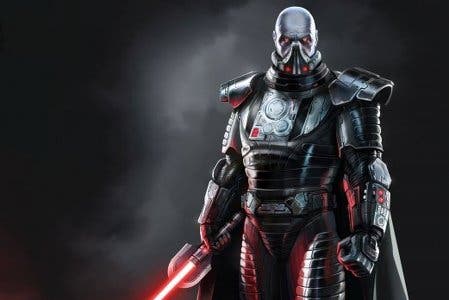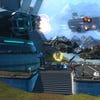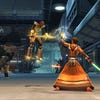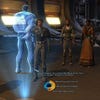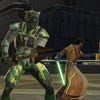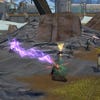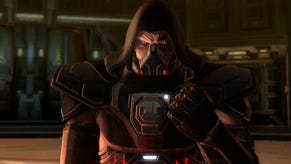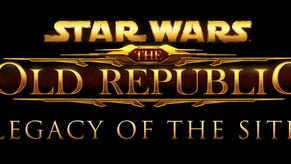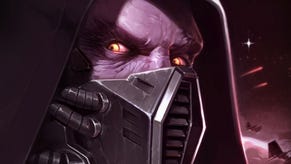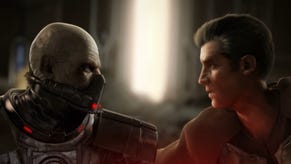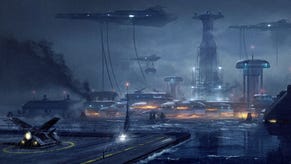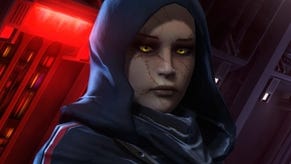Star Wars: The Old Republic Review
Are you Hoth or not?
You'd probably prefer it if I didn't mention World of Warcraft in this review. Seven years on and it's getting boring, I have to agree. But that's tough for both of us, because Star Wars: The Old Republic wouldn't exist without Blizzard's online world, and it's impossible to discuss without referring to it. There are two elephants in this room.
The Old Republic is largely made in WOW's image, and it's the latest and probably the last attempt by a cowed and frustrated industry to unseat it. Never has a game stopped an entire genre in its tracks like WOW has with massively multiplayer online gaming.
With the Star Wars and BioWare brands attached and an unimaginable amount of effort and money expended on its making - this Herculean project would make James Cameron or Cecil B De Mille blanch - The Old Republic has been given every chance of success. It has the timing right too, arriving just as WOW players' ennui has finally begun to outweigh Blizzard's genius for reinvention, and the old warhorse's subscriber numbers have started to fall. Could we really have a contender here?
Yes. The Old Republic is a solid beast, vast in scope and sound in construction, built on foundations that were well established even before Blizzard renovated them. With one glaring exception, it is an MMO in the classic style, offering everything exactly as you expect it and to the standard to which you have become accustomed. It's a painstaking note-for-note copy of WOW's design and features, with a few additions and ever fewer changes.
To be fair, that one exception is highly conspicuous: a single-player BioWare RPG has been bolted on to this stolid MMO template, with a typical focus on stories led by players' conversation choices. It's incongruous and clumsy, but not entirely unsuccessful.
After choosing whether to join the Empire or Republic, you can pick your race from a disappointingly samey line-up of lifeless humanoid action figures. Each faction offers four classes (loosely mirrored): you can be various flavours of Force-wielding Jedi and Sith, a Boba Fett-inspired Bounty Hunter, a Han Solo-style Smuggler, a military Trooper or an Imperial Agent.
"The Old Republic is a solid beast, vast in scope and sound in construction, built on foundations that were well established even before Blizzard renovated them."
Each of the eight has its own story arc, a dominant thread of missions leading all the way to the level 50 cap (which would take over 100 hours if you were rushing). If you've played Dragon Age or Mass Effect you'll be familiar with how it plays out: lots of talking-head exposition and political intrigue; relationship management with a few companion characters, including romance; a slow-burning tale that delivers big twists later on, some of them influenced by your choices.
The missions are sufficiently well crafted and linked to draw you in, and adding the pull of actual plot development to your levelling and exploration in an MMO does make an appreciable difference to your involvement - even if it does mostly happen in an instanced bubble that locks all but invited friends out.
Unfortunately, the sheer volume of content BioWare has had to produce to tell these eight stories takes its toll, along with the studio's mechanical approach to human interaction. The writing is flat, the staging and animation of the lengthy conversations is very basic and the subject matter is often dry, adult, cynical or plain boring - all of which feel more appropriate to the sterile politics of one of BioWare's own universes than the high adventure of Star Wars.
The game's light side/dark side morality is reductive and poorly handled, too. Interesting dilemmas are far outweighed by spoon-fed posturing that has no impact, and because rewards are unlocked for consistent light or dark side play, you're encouraged to game the system rather than go with your gut.
Beyond that, the combination of this inflexible moral code with MMO mechanics and BioWare's arid house style has (accidentally, I assume) produced a chillingly bleak and empty vision of human nature. In The Old Republic's world, the difference between evil and good is all too often the difference between murder and taking a bribe to look the other way, and the prevalent question is always "What do I get out of it?" (As a friend put it, in this game Han shoots first and then loots the corpse.)
Meanwhile, the way this teen-rated game drops a few mild double entendres before fading to black in its hilariously wooden "romance" scenes can't disguise the fact that it treats sex as a sordid transaction. That has no place in a universe that defined so many childhoods.
All of that said, the class stories are still welcome as a new item in the MMO buffet and as an opportunity to invest a bit more in the characters we're going to be living with. The problem is that BioWare has extended this format to absolutely all of the game's mission content, a dignity it really doesn't deserve. The majority of filler missions are no more imaginative in their framing and construction than the MMO norm - go and kill some of those, get that thing and press yonder button - so having them framed in wordy cut-scenes and meaningless conversation options is boring, faintly ridiculous and achingly slow.
"The combination of an inflexible moral code with MMO mechanics and BioWare's arid house style has (accidentally, I assume) produced a chillingly bleak and empty vision of human nature."
For the first 15 levels or so, this ponderous pace threatens to sink The Old Republic entirely. Happily, things pick up when you're given access to your faction's capital fleet and your own starship. The game then opens out to include Flashpoints (dungeons, basically), space combat (a fun arcade mini-game in the form of a single-player rail shooter) and player-versus-player (in Warzone matches and in the open world, if you picked a PVP server).
Wisely, BioWare has ensured you earn large dollops of experience and reward for all these activities. Hopping between them and your class story while limiting the amount of solo mission grind you do is a very viable and quick way to level up - and, it turns out, a really enjoyable one.
Space combat is pretty throwaway but it's very slick, gratifying and Star Wars-like, and a great palate cleanser. It's a real shame it's only ever for one player.
Open-world PVP hasn't really picked up yet, and the three Warzones are a basic offering that probably won't sustain competitive players' interest for long at maximum level. They are great fun though - simple, sound game types and maps, entertainingly presented with plenty of Star Wars flavour. Huttball is a spectator sport with two teams attempting to pick a ball up and run it to their opponents' goal line; Alderaan is a domination map, with teams attempting to control cannons to turn them on each others' starships; and Voidstar is an assault-style setup, with teams taking turns to attack or defend the bridge of a derelict Imperial Battle Cruiser.
The rudimentary matchmaking is a shame - there's no level banding, with all players boosted to max level, and you can't specify which map to queue for. It's at moments like these that you remember that BioWare has limited experience in multiplayer gaming. Frankly, it's surprising and encouraging that there aren't more of them.
Flashpoints are a very good stab at an MMO staple. They could be more memorable, perhaps, but they're very nicely tuned for four players, with none dragging on too long, while the complexity and difficulty of encounters is pitched to keep you on your toes. They also present the best opportunity to see how BioWare's conversational storytelling works in a multiplayer scenario: surprisingly well, with dice rolls determining who gets to influence events, but your own decisions counting toward your character's alignment. It's an appealing new social dynamic, although BioWare is struggling to find the right balance for the prominence of conversations in Flashpoints.
Participating in multiplayer conversations is the principal way to earn Social Points, a slightly dispiriting reward scheme for playing with others. Good company ought to be its own reward, and this is one of a few signs of BioWare feeling ill at ease in this realm; social gaming is an alchemical thrill that can't be expressed in a progress bar.
"Hopping between space combat, PVP, Flashpoints and your class story while limiting the amount of solo mission grind you do is a very viable and quick way to level up - and, it turns out, a really enjoyable one."
There are plenty of better reasons to group up, though, notably the Heroic missions and areas. These, like the Elite zones that have sadly been wiped from the face of WOW's Azeroth over the years, present players with really tough enemies in amongst the chaff on the game's general play fields. Most planets also feature a free-roaming world boss, too. These can all be skipped, but you won't want to, and most players are happy to group up; here's hoping social apathy doesn't set in and outmode these zones as it did in WOW.
Aside from that, the community is much like WOW's in latter years - more businesslike than warm, but friendly enough and still with that new-game fizz of excitement. It won't ever be like the first time, but it's still nice to catch it while it lasts; there really is no substitute for adventuring alongside others in a persistent online world. Which makes it odd that BioWare has attempted just such a substitute, in the form of AI companions.
You collect a crew as you play and can influence their affection for you with conversation choices and gifts, as well as sending them on crafting tasks. Additionally, you can bring one with you into combat. In theory, they're no different from a hunter's pet or summoner's familiar in other games.
But that's not how they're presented, and for me the companions are critical immersion-breakers in an online world. I don't like seeing other players of my class running around with the same companion, and I feel these dogged animatronic servants devalue the presence of real friends and strangers in the world. Being with someone else isn't as special if you're never alone, and no amount of Social Points is going to make up for that.
It's a philosophical objection, though, and their practical impact is much more benign: thanks to companions, BioWare has been able to introduce combat roles and a little more sophistication and difficulty into run-of-the-mill solo questing. Indeed, challenge is well pitched throughout the game, with a wide range of enemy strengths and abilities ensuring levelling stays interesting. It's not the sleepwalk of questing in modern WOW - but it also lacks the variety and sense of fun that Blizzard introduced as it dumbed the action down.
The Old Republic's conventional MMO combat isn't going to win over any objectors, but the skills are well designed, with great utility and punchy effects that remind you you're playing a Star Wars game. Each of the eight classes splits into two advanced classes at level 10, and these can be specialised further in skill trees (which are an exceptionally tedious take on the 'percentage game' school of talent tree design).
With even the advanced classes being able to fill multiple roles, the classes can be a little unfocused, lacking the iconic definition of the very best. However, they are all extremely flexible and can cope with a wide range of situations, even after specialisation. And they're all good fun to play, delivering capably on that critical Star Wars wish fulfilment.
It's as a Star Wars game that The Old Republic is hardest to judge. Some of the content - whether it stems from MMO tradition or BioWare's tastes - is jarring. And although the game has a tidy interface and clean looks, no Star Wars universe should be this drab.
A few famous locations aside, the world-building effort has produced a procession of oversized, cut-and-paste brown wastelands and purple jungles, populated with formless monsters and dotted with cavernous, empty, symmetrical buildings. Oh the disappointment when the moon of Nar Shaddaa - purportedly a Hutt-run mix of Blade Runner and 1920s Shanghai - turns out to be a few indistinguishable blocks of grey boxes behind the neon.
"The Old Republic offers a deep well of content, a spread of fun activities and a reliable service for as long as you want to explore its multiple storylines. How long will that be, though? "
But then again, the magnificent sound - including a spine-tingling musical score that expertly pastiches John Williams' original - adds an incalculable atmosphere to the game. So do the simple cutaways of your ship arriving at a new planet, or the bountiful and effortlessly cool costume, vehicle and technology designs plundered from Lucas' portfolio and elegantly iterated on by BioWare's artists. It's not the world it should have been, and the tone of the storytelling is off - but the ambiance is just right.
And as an MMO? Star Wars: The Old Republic is overwhelmingly competent, a studious and careful piece of work that rarely puts a foot wrong in imitating the best of the rest, and that just about manages to smooth the join between its ostensibly mismatched solo and multiplayer components. It offers a deep well of content, a spread of fun activities and a reliable service for as long as you want to explore its multiple storylines.
How long will that be, though? With such an insanely resource-intensive production, can BioWare flesh out a compelling endgame fast enough? And would that even help? Under the surface and behind all that talk, The Old Republic is just that, old: a deeply traditional framework for an online game that is in dire need of a refresh and is currently struggling to sustain WOW. It's well placed for success right now, but it might not be long before The Old Republic finds itself just as vulnerable as its inspiration to a hungry breed of more innovative games.
BioWare has done what many thought might be impossible, and delivered the world's second ever triple-A MMO. That is a mighty achievement and a huge relief. But it may yet turn out to be too little - or rather, too much - too late.
